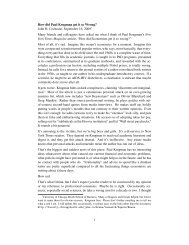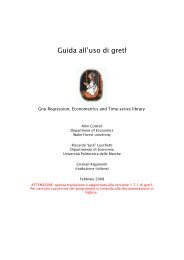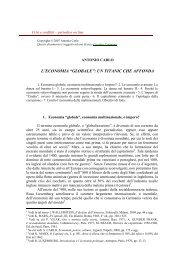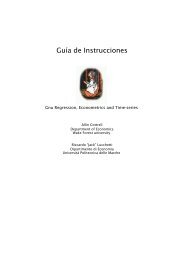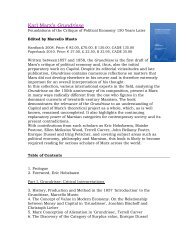The Labor Market of the Early Roman Empire - Wake Forest University
The Labor Market of the Early Roman Empire - Wake Forest University
The Labor Market of the Early Roman Empire - Wake Forest University
You also want an ePaper? Increase the reach of your titles
YUMPU automatically turns print PDFs into web optimized ePapers that Google loves.
520 | PETER TEMIN<br />
lated estates can be distinguished by <strong>the</strong>ir receipt <strong>of</strong> opsonion (salary),<br />
a xed monthly allowance <strong>of</strong> cash and wheat and sometimes<br />
vegetable oil, whereas occasional employees received misthos, that<br />
is ‘wages.’” some <strong>of</strong> <strong>the</strong>se “free” workers were tied to <strong>the</strong> estate<br />
for life, like those subject to <strong>the</strong> more modern worker contracts<br />
studied by Steinfeld, but o<strong>the</strong>rs were free to leave when <strong>the</strong>ir jobs<br />
were done. 12<br />
Miners and apprentices had employment contracts. One dating<br />
from 164 c.e. shows that workers were paid only for work<br />
done and that <strong>the</strong>y had more right to quit than <strong>the</strong> nineteenthcentury<br />
workers described by Steinfeld:<br />
In <strong>the</strong> consulship <strong>of</strong> Macrinus and Celsus, May 20. I, Flavius<br />
Secundinus, at <strong>the</strong> request <strong>of</strong> Memmius, son <strong>of</strong> Asceplius, have<br />
here recorded <strong>the</strong> fact that he declared that he had let, and he did in<br />
fact let, his labor in <strong>the</strong> gold mine to Aurelius Adjutor from this day<br />
to November 13 next for seventy denarii and board. He shall be<br />
entitled to receive his wages in installments. He shall be required to<br />
render healthy and vigorous labor to <strong>the</strong> above-mentioned employer.<br />
If he wants to quit or stop working against <strong>the</strong> employer’s<br />
wishes, he shall have to pay ve sesterces for each day, deducted<br />
from his total wages. If a ood hinders operations, he shall be required<br />
to prorate accordingly. If <strong>the</strong> employer delays payment <strong>of</strong><br />
<strong>the</strong> wage when <strong>the</strong> time is up, he shall be subject to <strong>the</strong> same penalty<br />
after three days <strong>of</strong> grace. 13<br />
Most free workers were farmers, many <strong>of</strong> <strong>the</strong>m tenant farmers,<br />
although employment categories in <strong>the</strong> countryside were<br />
uid. <strong>Roman</strong> tenancy contracts allocated risks between landowners<br />
and tenants in much <strong>the</strong> same way as analogous contracts did in<br />
eighteenth- and nineteenth-century Britain. Major risks were<br />
borne by <strong>the</strong> landowners as events beyond <strong>the</strong> tenants’ control,<br />
whereas minor risks were borne by tenants in return for <strong>the</strong> opportunity<br />
to earn more and keep <strong>the</strong>ir earnings: “Force majeure<br />
ought not cause loss to <strong>the</strong> tenant, if <strong>the</strong> crops have been damaged<br />
beyond what is sustainable. But <strong>the</strong> tenant ought to bear loss<br />
which is moderate with equanimity, just as he does not have to<br />
give up pro ts which are immoderate. It will be obvious that we<br />
12 Rathbone, Economic Rationalism, 91–92.<br />
13 CIL III, translated in Naftali Lewis and Meyer Reinhold (eds.), <strong>Roman</strong> Civilization: Selected<br />
Readings (New York, 1990; orig. pub. 1951), II, 948.



